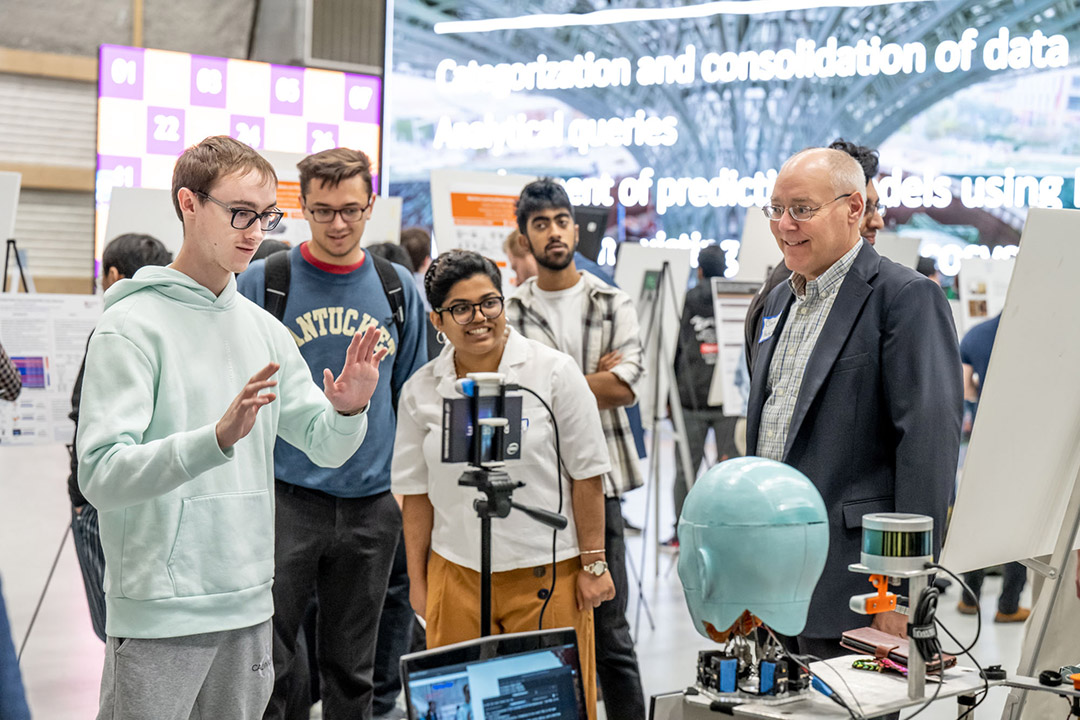RIT surpasses $102 million in research funding for a single fiscal year
University’s Strategic Plan milestone reached early amid funding toward national priority initiatives
Scott Hamilton/RIT
One of RIT’s first NSF Research Training program grants to support graduate research initiatives was in artificial intelligence (AI). Students and faculty introduced AI options at a recent campus symposium.
Rochester Institute of Technology achieved a significant milestone by receiving $102 million in sponsored research awards during its past fiscal year, surpassing a key goal in its strategic plan a year ahead of schedule.
This achievement marks a nearly 100 percent growth in sponsored research awards since 2014 when the strategic plan was created, underscoring RIT’s emergence as a nationally recognized research university, said Ryne Raffaelle, RIT’s vice president for Research.
“Ten years ago, RIT set a priority in its strategic plan to achieve $100 million in obligated research awards within a single fiscal year,” said Raffaelle. “When the plan was drafted, this milestone was seen as a stretch goal. Achieving it a full year ahead of schedule is a testament to the excellence of our faculty, staff, and students engaged in research at RIT.”
The FY24 total includes significant growth in competitive awards from federal sources. RIT received record funding from the National Science Foundation (NSF) ($20 million), the National Institutes of Health ($10 million), and the Department of Defense (DOD) ($23 million). These awards support a diverse range of projects, from quantum communication and expanding lithium battery manufacturing to controlling microplastics pollution in the Great Lakes watershed and modeling supermassive black holes.
A significant portion of the funding is dedicated to workforce development and enhancing skills for future professionals across a wide range of STEM careers, from technicians to Ph.D.’s. RIT received numerous new awards from the NSF and other federal agencies to develop new curricula, undergraduate and graduate training initiatives, and graduate research fellowships.
As an example, RIT received a prestigious NSF National Research Traineeship (NRT) award which supports interdisciplinary education related to artificial intelligence. Additionally, RIT received a second NSF NRT award focused on developing graduate-level interdisciplinary training in Complementary Metal-Oxide-Semiconductor (CMOS) technology, essential for designing and building computer chips. The training programs complement ongoing support from the DOD and the NSF, aimed at recruiting and training the next generation of cybersecurity experts at both undergraduate and graduate levels. Increasing sponsored research awards also empowers RIT to significantly contribute to U.S. competitiveness and address global challenges.
“These STEM training awards demonstrate the caliber of our faculty and the need for the degree programs we offer. We are proud that RIT is recognized by federal agencies as an important asset in training the workforce of the future,” said Raffaelle. “Expanding our research portfolio underscores our dedication to addressing critical issues affecting our community, state, country, and the world. This surge in research activity also creates more opportunities for undergraduate and graduate students to participate in experiential learning with leading faculty members, equipping our graduates for future careers.”
RIT is in the process of developing its next strategic plan, carefully considering its future research aspirations, including setting ambitious goals for continued research growth and an increase in advanced degrees conferred.
“Here is what some of our local public officials said about RIT reaching, and surpassing, this significant milestone”:
- "Congratulations to RIT in reaching its strategic goal with this $100 million milestone in sponsored research awards,” said New York State Assemblyman Harry Bronson. “Through these grants RIT builds upon its distinguished position of innovation and creativity in the applied science arena. With these grants RIT continues its focus on workforce development to prepare future professionals for the expanding and emerging industries of today and for tomorrow. RIT's work helps to make the Greater Rochester area and indeed our state a true competitor on the global market while providing true opportunities for its undergraduate and graduate students."
- “RIT is a national leader when it comes to cutting-edge research, training the next generation of innovators, and contributing to technological advancements across our country,” said New York State Senator Jeremy Cooney. “Congratulations on reaching this benchmark and thank you for all you do to support our Rochester community!”
- “Congratulations to Rochester Institute of Technology on achieving this significant milestone,” said Congressman Joe Morelle. “This underscores the strength of their world-class research capabilities and is a testament to their growth and leadership. I look forward to our continued partnership, particularly as we leverage our region’s designation as a Regional Technology Hub—together we will advance RIT’s legacy of academic excellence, train the workforce of the future, and strengthen our local economy.”











